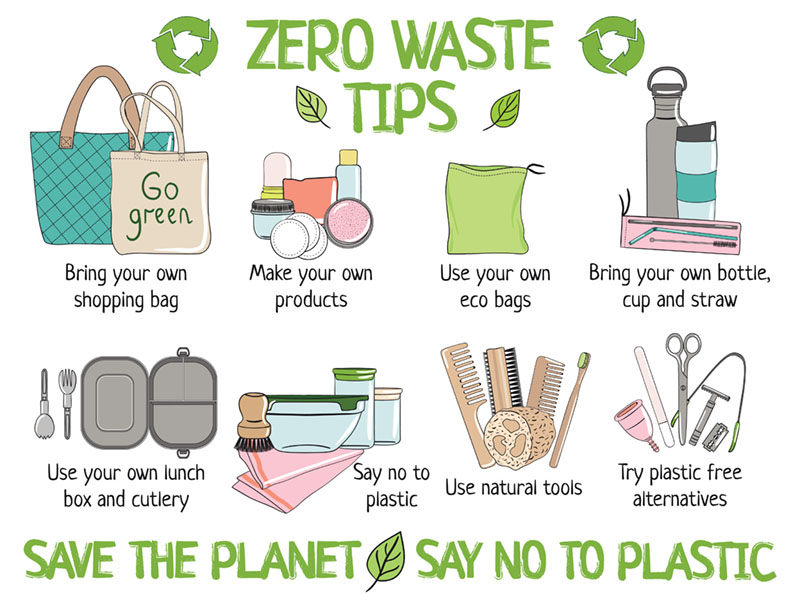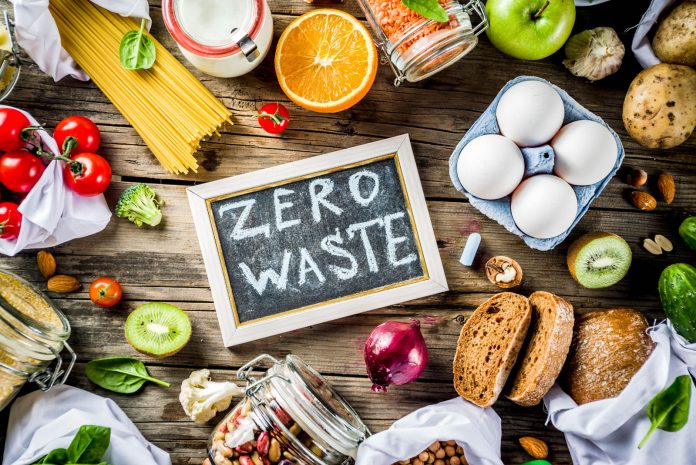Anne Marie Bonneau, the Zero Waste Chef, says it perfectly: “We don’t need a handful of people doing zero waste perfectly. We need millions of people doing it imperfectly.” To help you out wherever you are on your journey, here are 35 super easy zero waste tips & swaps anyone can do.
The 5 R’s of Zero Waste Living
- Refuse – Say “no” to things you don’t absolutely need
- Reduce – Minimize what you do need
- Reuse – Give items a new life by reusing/upcycling them
- Recycle – Properly recycle items you can’t reuse
- Rot – Compost the rest
(Courtesy of Bea Johnson of Zero Waste Home)
Easy Zero Waste Tips For Anyone
Here, we’re going to focus on our favorite R: Refuse. When you start to say “no” to the things you never really needed in the first place, you’ll realize that zero waste is easier than expected. Then, you’ll be encouraged to experiment with some of the other R’s, like reduce and reuse.
1. Don’t Be Afraid to Say “No”
Here we’re talking about when you’re eating out (“no straw, please”) and at the grocery store (“no bag, please”). You might get an interesting look in response, but Mother Earth will be applauding your efforts.
This can also mean saying “no” at an event when promotional “freebies” are passed out. They may be free to you, but they’re racking up the bill for our planet. It could also mean removing your name from mailing lists (through this website) so that you don’t get any junk mail.
2. Don’t Forget Your Reusable Water Bottle
We probably don’t need to remind you that each year more than 17 million barrels of oil are used to keep up with America’s plastic water bottle demand (Harvard). Then, more than 80% of them end up in landfills or oceans.
Drinking water is essential for life, just make sure you’re doing so with an eco-friendly water bottle.
3. Get a Library Card
For the avid readers of the world, getting (and using) a library card is one of the best ways to support a circular economy. Plus, it satisfies a love for “real book” smells without requiring the printing of any new books!
4. Donate and Buy Donated
Buying from and donating to thrift stores is another way to support your local circular economy. It’s a great way to recycle your old goods, and buying second hand products is an Earth-favorite way to get something “new.”
Plus, a weekend spent hunting down some unique thrifted finds is much more exciting than quickly hitting an “Add to Cart” button.
5. Make Your Own
When it comes to things like food, beauty, cleaning, and personal care products, making our own is not only a better option from an environmental standpoint, but also from a health standpoint.
Spend an afternoon looking at DIY guides (like this one for cleaning products) and try your hand at making your own! DIY cheese crackers might not taste exactly like store bought ones, but they come without plastic and any unrecognizable ingredients!
6. Use a Shopping List
Food waste necessitates the zero waste movement in its own right, which is to say that it’s a massive problem. When it comes to buying and eating food sustainably, many of us could do a little better.
Designating an ‘eat me now’ area in the fridge can allow you to see the leftovers and produce that need to be eaten right away. This will prevent the waste of that old spaghetti that lives behind your milk carton for months…
When you have a better idea of what you already have, use a shopping list and stick to it! Don’t fall for sales or strategically-placed junk food. Buying what you need and meal planning with what you have will allow you to cut down on waste in the kitchen.
7. Start Composting
For all of the food scraps that don’t get eaten, make sure you have a composting system in place. Not only will you be left with something valuable for the garden, but composting minimizes the emissions associated with food breaking down in landfills.
Live in a small space? Don’t worry! There are great composting options for apartments too!
8. Always Have a Reusable Coffee Cup
It’s been estimated that Americans throw away more than 50 billion paper coffee cups every single year. Don’t contribute to that statistic, always have a reusable coffee cup with you.
9. Do Less Laundry
For those of us who feel like we never leave the laundry room, this is a great zero-waste tip! Unless we’re getting our clothes excessively sweaty or muddy, we don’t actually need to wash them as often as we do. By doing less laundry we can save water and minimize the amount of microplastics that end up in our ocean.
When you do have to put a load on, use eco-friendly and refillable zero waste laundry detergent and cold water.
10. Shop in Bulk
Food packaging is a big problem, not to mention that it typically accompanies foods that are less healthy…
Try to find a local grocery store or organic supermarket that has a bulk section. When you buy grains, seeds, nuts, coffee, tea, oils, and more in bulk, you’ll minimize your plastic packaging and save money.
There are online grocery bulk stores, too! We like Azure Standard.
11. Adopt a “Slow Tech” Philosophy
Before the iPhone27 comes out, take some time to think about if you actually need it. Yeah it’s fun to see the new updates, but are they even worth it? Our favorite tech products are made with intensively-mined minerals and non-recyclable inputs, so replacing them as little as possible is better for the planet (and our wallets).
12. Re-define Gift Giving
With the holidays coming up, it’s easy to get into a shopping frenzy. Before you do any shopping (or wish list-writing), think about all that you and your loved ones already have. Then, consider buying experiences instead.
Even better, join friends and family for a day of giving at a local soup kitchen instead of tearing off gift wrap for socks you’ll never wear.
13. Learn New Skills
When many of us buy new clothes we do so because the ones we own have broken zippers, lost buttons, or holes that need mended. Instead of buying something new, take the time to learn how to make these repairs yourself. In many cases it is much easier to learn than we may imagine, and the cost of tools (i.e. needle and thread) is much less than a new garment.
14. Become a Recycling Professional
Do you really know what can be recycled in your area? Do you know that if just one item is improperly placed in the recycling bin, it’s likely that the entire bin will have to be thrown away instead?
To really cut down on your waste, make sure you’re recycling properly. Check your local government website for more information about what can and cannot be recycled.
For hard-to-recycle items, look into a Terracycle near you.
15. Lead By Example
To have the biggest zero-waste impact, make sure you lead by example and have conversations with friends and family about how they can reduce their waste. We’re all in this together!


Easy Zero Waste Swaps For Anyone
16. French press instead of coffee maker/Keurig
17. Tea ball instead of tea bags
18. Handkerchiefs instead of tissues
19. Bamboo toothbrush instead of plastic toothbrush (just remove the nylon bristles before composting!)
20. Glass jars instead of…everything! Reusing glass jars from pasta sauce, peanut butter, etc. is a perfect replacement for plastic food containers, water bottles, bulk food storage, and even as a coffee cup (add upcycled rubber bands from produce to make a “sleeve”).
21. Reusable shopping bags instead of plastic bags (just skip the produce bags altogether!)
22. Zero waste deodorant (in a jar or compostable tube) instead of plastic deodorant containers (which are notoriously difficult to recycle)
23. Zero waste beauty products instead of plastic (look for glass, aluminum, compostable cardboard, or refillable options)
24. Reusable cutlery and plates instead of plastic cutlery and paper plates
25. Cloth rags instead of paper towels (Unpaper towels are great, too!)
26. Beeswax wraps instead of foil or Saran Wrap
27. Newspaper trash can liner instead of plastic bags (since you’ll be composting most of the “wet” materials, you’ll have little need for a liner at all
28. Recycled/bamboo toilet paper instead of “virgin” toilet paper
29. Safety razor instead of plastic razor
30. Menstrual cup and period underwear instead of tampons and pads
31. Shampoo + conditioner bars instead of liquid shampoo + conditioner (which are 80% water anyway!)
32. Zero waste toothpaste instead of a plastic toothpaste tube
33. Biodegradable toilet brush instead of a nylon brush
34. Zero waste cleaning products instead of several chemicals for different purposes
35. Rechargeable batteries instead of non-rechargeable (and difficult-to-recycle) ones
_______________
We hope these easy zero waste tips and swaps helped give you some inspiration and helped you to feel confident that anyone can make easy changes to their lifestyle.
What other zero waste tips would you share? Let us know in the comments below!














